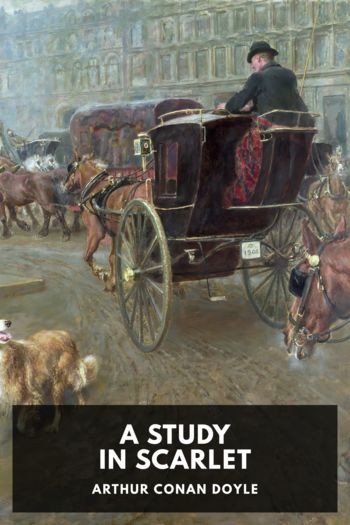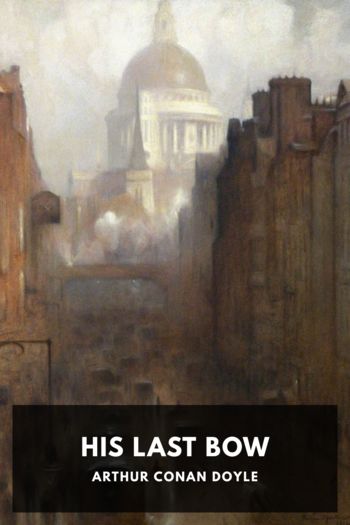A Study in Scarlet by Arthur Conan Doyle (ebook reader with highlighter txt) 📕

- Author: Arthur Conan Doyle
Book online «A Study in Scarlet by Arthur Conan Doyle (ebook reader with highlighter txt) 📕». Author Arthur Conan Doyle
He was very late in returning—so late, that I knew that the concert could not have detained him all the time. Dinner was on the table before he appeared.
“It was magnificent,” he said, as he took his seat. “Do you remember what Darwin says about music? He claims that the power of producing and appreciating it existed among the human race long before the power of speech was arrived at. Perhaps that is why we are so subtly influenced by it. There are vague memories in our souls of those misty centuries when the world was in its childhood.”
“That’s rather a broad idea,” I remarked.
“One’s ideas must be as broad as Nature if they are to interpret Nature,” he answered. “What’s the matter? You’re not looking quite yourself. This Brixton Road affair has upset you.”
“To tell the truth, it has,” I said. “I ought to be more case-hardened after my Afghan experiences. I saw my own comrades hacked to pieces at Maiwand without losing my nerve.”
“I can understand. There is a mystery about this which stimulates the imagination; where there is no imagination there is no horror. Have you seen the evening paper?”
“No.”
“It gives a fairly good account of the affair. It does not mention the fact that when the man was raised up, a woman’s wedding ring fell upon the floor. It is just as well it does not.”
“Why?”
“Look at this advertisement,” he answered. “I had one sent to every paper this morning immediately after the affair.”
He threw the paper across to me and I glanced at the place indicated. It was the first announcement in the “Found” column. “In Brixton Road, this morning,” it ran, “a plain gold wedding ring, found in the roadway between the White Hart Tavern and Holland Grove. Apply Dr. Watson, 221B, Baker Street, between eight and nine this evening.”
“Excuse my using your name,” he said. “If I used my own some of these dunderheads would recognize it, and want to meddle in the affair.”
“That is all right,” I answered. “But supposing anyone applies, I have no ring.”
“Oh yes, you have,” said he, handing me one. “This will do very well. It is almost a facsimile.”
“And who do you expect will answer this advertisement.”
“Why, the man in the brown coat—our florid friend with the square toes. If he does not come himself he will send an accomplice.”
“Would he not consider it as too dangerous?”
“Not at all. If my view of the case is correct, and I have every reason to believe that it is, this man would rather risk anything than lose the ring. According to my notion he dropped it while stooping over Drebber’s body, and did not miss it at the time. After leaving the house he discovered his loss and hurried back, but found the police already in possession, owing to his own folly in leaving the candle burning. He had to pretend to be drunk in order to allay the suspicions which might have been aroused by his appearance at the gate. Now put yourself in that man’s place. On thinking the matter over, it must have occurred to him that it was possible that he had lost the ring in the road after leaving the house. What would he do, then? He would eagerly look out for the evening papers in the hope of seeing it among the articles found. His eye, of course, would light upon this. He would be overjoyed. Why should he fear a trap? There would be no reason in his eyes why the finding of the ring should be connected with the murder. He would come. He will come. You shall see him within an hour.”
“And then?” I asked.
“Oh, you can leave me to deal with him then. Have you any arms?”
“I have my old service revolver and a few cartridges.”
“You had better clean it and load it. He will be a desperate man, and though I shall take him unawares, it is as well to be ready for anything.”
I went to my bedroom and followed his advice. When I returned with the pistol the table had been cleared, and Holmes was engaged in his favourite occupation of scraping upon his violin.
“The plot thickens,” he said, as I entered; “I have just had an answer to my American telegram. My view of the case is the correct one.”
“And that is?” I asked eagerly.
“My fiddle would be the better for new strings,” he remarked. “Put your pistol in your pocket. When the fellow comes speak to him in an ordinary way. Leave the rest to me. Don’t frighten him by looking at him too hard.”
“It is eight o’clock now,” I said, glancing at my watch.
“Yes. He will probably be here in a few minutes. Open the door slightly. That will do. Now put the key on the inside. Thank you! This is a queer old book I picked up at a stall yesterday—De Jure inter Gentes—published in Latin at Liege in the Lowlands, in 1642. Charles’ head was still firm on his shoulders when this little brown-backed volume was struck off.”
“Who is the printer?”
“Philippe de Croy, whoever he may have been. On the flyleaf, in very faded ink, is written ‘Ex libris Guliolmi Whyte.’ I wonder who William Whyte was. Some pragmatical seventeenth century lawyer, I suppose. His writing has a legal twist about it. Here comes our man, I think.”
As he spoke there was a sharp ring at the bell. Sherlock Holmes rose softly and moved his chair in the direction of the door. We heard the servant pass along the hall, and the sharp click of the latch as she opened it.
“Does Dr. Watson live here?” asked a clear but rather harsh voice. We could not hear the





Comments (0)